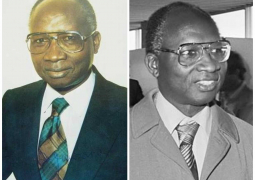Great initiatives have been taken recently by the government to launch an agricultural project to boost small holder activities in agricultural production. The Ministry of Agriculture must be commended for thinking about how to enhance the food and nutrition security of the country and to reduce poverty in rural communities.
It must be stated, however, that such a project initiative should have gone in tandem with a commercial agriculture project to ensure greater food security of the country. Subsistence farming cannot bring about food self-sufficiency and the desired economic growth. The development partners know very well that commercial agriculture is the gateway to value-driven food security solutions.
To create employment and to excite economic growth, the government must recognize the need to re-orientate agriculture towards commercialization. Moving the agriculture sector at a snail’s pace will not ensure poverty alleviation and real growth in the economy. The technocratic and professional competences must be employed to advise government on the right path to a system of agriculture that will be productive and ensure resilience to climate change.
We have Gambian experts such as Tamsir Njie, Ernest Aubee, Sidi Sanneh, Musa Mbenga and many others who can bring about implementable and transformative changes in agricultural development in the national interest. The functional positioning of technocrats in the process of agriculture development is critical and a national imperative. There is no better strategy to poverty alleviation than moving agriculture in a rapid and substantial manner. In this context, therefore, policy decisions in Gambia’s agricultural development must be based on our objective realities and homegrown solutions. The technical expertise for project implementation is available in the country.
The best way to put wealth in the hands of Gambian farmers is through their empowerment in the agriculture sector. In this regard, the instruments of production, such as machinery, farming equipment, farm inputs, and the processing of food, technical assistance should be resourced by government and joint venture initiatives with formidable private sector operators to be the way forward to the implementation of commercial agriculture value-driven strategies. Agricultural pattern should be based on crop diversification with extensive use of reliable irrigation systems.
The country cannot continue to depend on one major crop (groundnuts) for processing and exports. It is time for the state to declare cashew nuts, tropical mangoes, and sesamin as cash crops and to incorporate these in the processing and marketing strategy to enhance the country’s exports base and foreign exchange earnings. The Gambia Food Processing and Marketing Corporation should be mandated by government to take on board this responsibility. For too long foreign business operators have exploited these resources to the economic disadvantage of the country. For agriculture to serve as the vehicle for economic development, there must be the policy shift from development aid that is suggested to the country to development aid that is envisaged or solicited by the country.
The country lacks the infrastructure for food processing, packaging and preservation, which altogether hinders agriculture production across the country. These felt needs of the country should by now capture the attention of government. It should therefore be a priority for the development partners such as UNIDO, IFAD, FAO, WORLD BANK, AFDB, IDB, etc. to be approached by the government in search of funding for the infrastructure for agriculture value-driven projects in The Gambia. It will be a logical step in the right direction.
Perhaps, at this juncture, I should reiterate the warning given to Africa by Kwame Nkrumah that “Anytime we import goods which could have been produced here, we are delaying our economic growth and furthering our economic dependence.” The late President Jawara had also warned Gambians that “independence is not a magical formula that will transform our groundnuts into diamonds. It means we are on our own and by our own efforts we must earn our keep.”
Gambians, let us eat what we grow and grow what we eat. Sustainable development is possible only in agriculture mechanization, production and processing. The long waits for food security is not the solution. Every year, the country spends billions of dollars on food imports, monies which could have been used to accelerate full-scale agricultural production for the food self-sufficiency of the country. The springboards to Western and Asian development were rooted in agriculture development.




